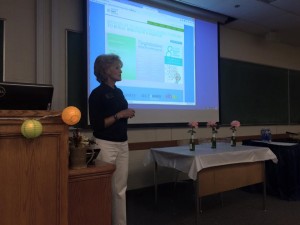
Some of the first computer programmers were women hired during WWII to compute explosive trajectory for the Allied assault; however, women today only make up a fraction of the workforce in technology careers.
The U.S. Bureau of Labor determined that the average pay for a computer programmer in 2014 was $77,000 per year. Many are looking to rush into the industry. The American Association of University Women released a report stating that only 26 percent of computer and mathematical jobs are owned by women, despite the prospect of a high entry-level salary.
Women in CS at BYU
Students in the computer science major at BYU have also noticed this trend. One club at BYU is trying to make computer programming more appealing and inviting for females.
The club, Women in CS, has existed at several times throughout BYU history. Its main purpose is to increase the participation of women in computer science-related fields.
It also tries to showcase role models from the technology arena who have been successful working women and mothers. These role models demonstrate that they can work in and contribute to the computer programming field while raising a successful family.
Women in CS reported an increase in female enrollment in the introductory computer programming class. They reached a milestone Fall semester when more than 100 female students were enrolled in CS 142.
“We saw a huge influx of women in CS 142,” Madeline MacDonald, secretary for the Women in CS club, said. “Unfortunately, we also see a high dropout rate after that class.”
There are several theories as to why this happens. One theory is that women are intimidated by the course material.
“Some women feel like they are intellectually behind everyone else in the class,” MacDonald said.
She noticed this when professors or classmates talk about video games and computer specifications when describing programming concepts. MacDonald said some women feel disadvantaged when they don’t recognize the references made.
MacDonald was exposed to computer programming at an early age. She attributes her success in computer programming to her father. His employment at Microsoft as a programmer gave her a glimpse into a programmer’s life. Her father never taught her programming, but she recognized that what he did was something she wanted to do.
“I knew that my dad went to work and solved interesting puzzles all day,” she said. “He always said computer programming was like a game of chess.”
MacDonald’s father even wrote a computer video game for her as a birthday present. She appreciated her father’s direct inclusion of computer programming in her own childhood. Her first exposures to coding were positive thanks to her father’s efforts. This helped her gain interest and confidence in coding instead of fearing the subject.
Alienation inside the major
However, once MacDonald began to study computer science in school, she faced big challenges.
“There’s subtle intimidation that you don’t have a place within the culture,” she said. “I’m rarely given the lead position in groups or sometimes I have my code checked more times than my guy counterparts.”
She said most of these interactions weren’t purposefully meant to offend or discriminate. She has learned to deal with it by showing a sense of humor.
“I stopped correcting everyone because it would offend people,” she said. “I just let everyone see me laugh when they say stereotypical things about women in programming.”

President of Women in CS Rebecca Hernandez-Tellez shares a similar view on how women interact in computer programming.
“Women lack the confidence, especially when starting out with computer programming,” Hernandez-Tellez said. “I’ve seen several students not ask a question and second-guess their code by running it five times successfully because they are unsure of themselves.”
Google produced a study that said students who are exposed to computer technology will likely have “higher levels of confidence in their ability to learn computer science.”
Hernandez-Tellez believes that this could change if women are included and viewed more as equals in the program.
She believes that men have more of a support system in place because they can comfortably approach other men.
“One time I asked a guy for help on a homework assignment and he kept bringing up the fact he had a girlfriend,” she said. “Thankfully not every guy in the program is that way.”
Hernandez-Tellez tries to ensure every woman studying computer science knows she and the other club officers are there for support. The support they provide can include tutoring or even a listening ear.
Another issue facing women in programming is a lack of interest due to incorrect preconceived ideas. This can be remedied if students are exposed to computer technology earlier in life.
Both MacDonald and Hernandez-Tellez took computer science classes in high school. Hernandez-Tellez had reservations when she enrolled in her first class. She thinks other females can relate.
“I was dreading my computer science class in high school because I thought I was going to be surrounded by un-showered, geeky guys,” she said. “I realized that wasn’t true.”
She explained that many women fear trying computer programming because they think they have to be a certain type of person. Her advice is to just take the leap and try it out.
“If you find out you don’t like it then you can say you don’t like it,” she said. “You’ll know at that point that it was because you didn’t like it and not because you weren’t intelligent enough.”
Successful programmers pave the way
The Women in CS club is also trying to provide opportunities for BYU female programmers to network and meet potential mentors. Cindy Snow, BYU’s first female computer science graduate, spoke to the group at one event.
Snow earned a bachelor’s degree in computer science in 1971 and began her career shortly afterwards, working as a senior programmer on the SSN-688 nuclear submarine. Hernandez-Tellez said Snow was able to demonstrate that women can have successful programming careers while also raising a family.
Other organizations are trying to inspire young girls to learn how to code. One organization, Girl Develop It, has several chapters throughout the country, including in Salt Lake and Provo.
[vc_video link=”https://www.youtube.com/watch?v=2vATWZ1Q02o”][/vc_column][/vc_row]
Lyza Nau is the founder of Provo’s Girl Develop It chapter. Her desire comes from her own struggles learning to code.
Nau left a dead-end job and went back to school. She studied digital media but found an interest in coding. She taught herself how to code when she wasn’t studying for her classes. She would often work on her coding skills late into the night.
Nau tries to inspire women in the Provo area to code and improve their skill sets.
“It’s not the most exciting thing to code,” Nau said. “I show them line-by-line how to do it. It’s through the problem solving and victories that get people excited.”
Girl Develop It hosts a Hack Night once a month and invites females to attend, but anyone is welcome. Participants can come to work on an existing coding project or idea, or to learn more about computers.
One of Nau’s biggest challenges when learning to code was communicating with others.
“It was really hard to learn the lingo,” she said. “Often other programmers would speak at a higher level.”
Nau attributes her success with computer programming through her own efforts as well as her faith.
“There were times that I would not understand a line of code,” she said. “When I reached my limits, I had to reach to a higher power to get through it.”
Nau has two daughters, and she is teaching them each coding. She feels like she owes it to her daughters to teach them early on so that they are more prepared and ready for the future.
“I’ve raised them both to code,” she said. “I’m proud they’re going down the engineering path.”
Nau hopes she’s making it easier for other females to be successful coders.
“It’s hard enough to be a woman,” she said. “I want each of them to know they can break down walls.”




